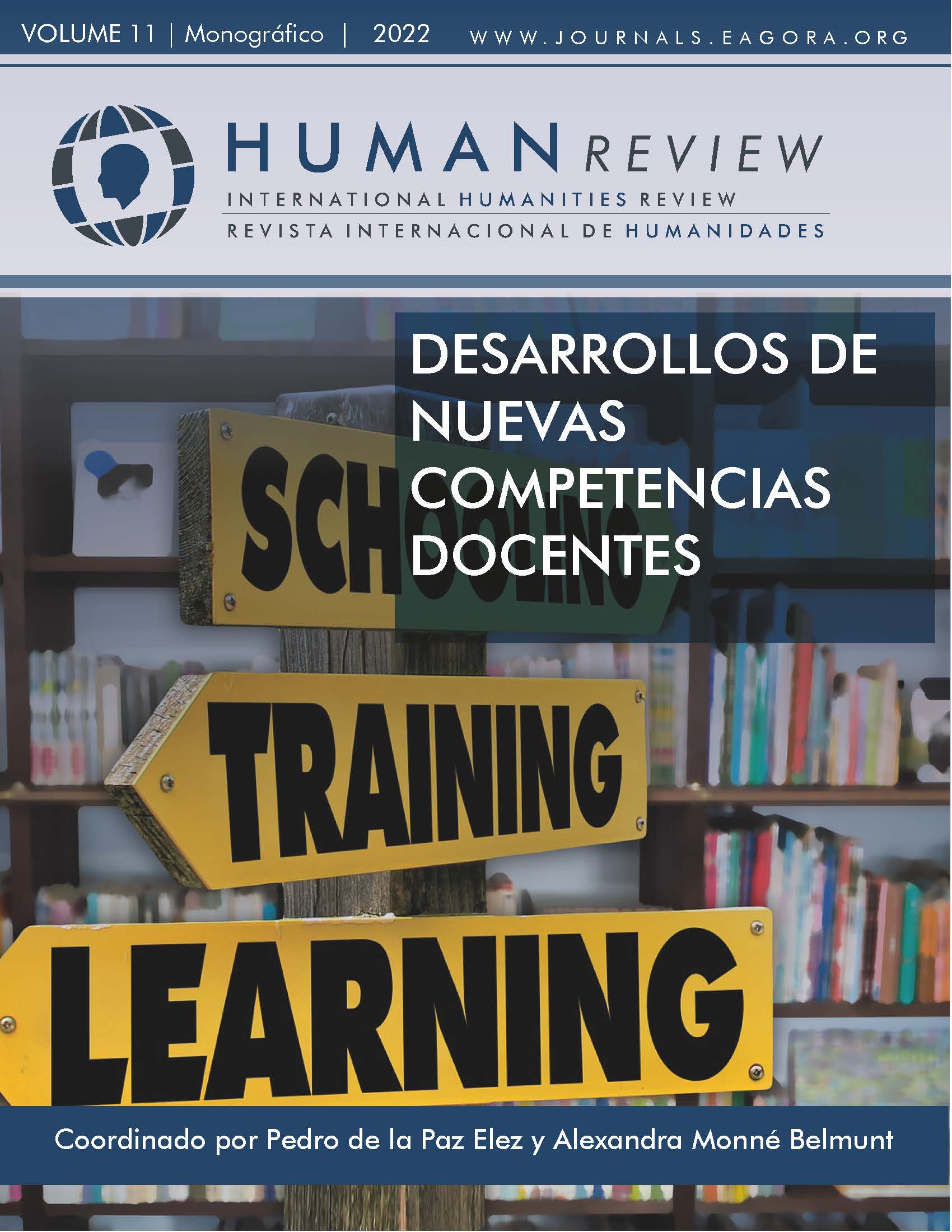The Teaching of Skills in Undergraduate Studies
Application case: Title of Leadership of the San Pablo CEU University
DOI:
https://doi.org/10.37467/revhuman.v11.3842Keywords:
Leadership, Skills, Methodology, Challenges, Employability, Design sprint, Agile methodsAbstract
This article describes an educational innovation project for learning skills, carried out in the Own Leadership Course of the San Pablo CEU University, transversal to all its educational offer. This is a new project based on hybrid teaching, where the more theoretical masterclasses have been complemented with a challenge-based learning linked to communication and sustainability matters, applying the Design Sprint methodology. In this way, the student is trained in the so-called soft skills that are increasingly in demand by the work environment.
References
ADECCO (2021). Informe Infoempleo Adecco: Oferta y Demanda de Empleo en España. The Adecco Group. https:// bit.ly/3MYjmBZ
Anijovich, R., De Camilloni, R. M. A., Cappelletti, G., Hoffmann, J., Katzkowics, R. y Mottier, L. (2010). La retroalimentación en la evaluación. La evaluación significativa. Buenos Aires: Paidós.
Apple Inc. (2010). Apple Classrooms of Tomorrow—Today. http://cbl.digitalpromise.org/wpcontent/uploads/sites/7/2017/07/ACOT2_Background.pdf
Boud, D. y Feletti, G. (1998). The Challenge of Problem-based Learning. London: Kogan Page.
Clarke, M. (2017). Repensar la empleabilidad de los graduados: el papel del capital, los atributos individuales y el contexto. Estudios en Educación Superior, 43 (11), 1923-1937.
Campo, E. y Ceballos, F. (2011). La calidad de la formación virtual en la enseñanza superior. Departamento de Automática, Universidad de Alcalá, I Congreso sobre Calidad de la Formación Virtual (CAFVIR2010), 151-158.
Cordray, D. S., Harris, T. R., y Klein, S. A. (2009). Research Synthesis of the Effectiveness, Replicability, and Generality of the VaNTH Challenge based Instructional Modules in Bioengineering. Journal of Engineering Education, 98 (4), 335-348. DOI: https://doi.org/10.1002/j.2168-9830.2009.tb01031.x
Deepika y Chitranshi, J. (2020). Preparación del líder de la Generación Z en el entorno empresarial VUCA, Foresight, Volumen antes de impresión (Núm. antes de impresión). https://doi.org/10.1108/FS-05-2020-0048. DOI: https://doi.org/10.1108/FS-05-2020-0048
Escudero Escorza, T. (2003). Desde los tests hasta la investigación evaluativa actual: Un siglo, el XX, de intenso desarrollo de la evaluación en educación. Revista Electrónica de Investigación y Evaluación Educativa, 9 (1). Recuperado de http://www.uv.es/RELIEVE/v9n1/RELIEVEv9n1_1.htm. DOI: https://doi.org/10.7203/relieve.9.1.4348
Fidalgo-Blanco, Á.; Sein-Echaluce, M. L. y García Peñalvo, F. J. (2017). Aprendizaje Basado en Retos en una asignatura académica universitaria. Revista Iberoamericana de Informática Educativa, (25), 1-8.
Gaskins,W. B., Johnson, J., Maltbie, C., & Kukreti, A. (2015). Changing the Learning Environment in the College of Engineering and Applied Science Using Challenge Based Learning, International Journal of Engineering Pedagogy, 5(1), 34-41. DOI: https://doi.org/10.3991/ijep.v5i1.4138
Instituto Tecnológico y de Estudios Superiores de Monterrey. (2016). Aprendizaje Basado en Retos. http://eduteka.icesi.edu.co/pdfdir/edutrendsaprendizaje-basado-en-retos.pdf
Instituto Tecnológico y de Estudios Superiores de Monterrey. (2016). Radar de Innovación Educativa 2017. http://eduteka.icesi.edu.co/pdfdir/edutrends-radar-innovacion-educativa2017.pdf
Johnson, L., Adams Becker, S., Estrada, V., and Freeman, A. (2015). NMC Horizon Report: Edición Educación Superior 2015. Austin, Texas: The New Media Consortium.
Knapp, J. (2018). Sprint. El método para resolver problemas y testar nuevas ideas en solo cinco días. Barcelona.
Editorial Conecta.
Kroll, C. (2015). Sustanaible Development Goals: Are the rich countries ready? Sustanaible Governance Indicator Bertelsman. Stiftung, Alemania: Gütersloh.
Kucukozyigit, Ali C. (2020) A Quest to Identify the Emerging Leadership Skills in VUCA World and Investigation of Their Applications in Various Organizational Levels and Security Environments. Doctor of Philosophy (PhD), Dissertation, Engineering Management, Old Dominion University. Doi: 10.25777/ y7ah-4b43
Larmer, J. (2015). Project-Based Learning vs. Problem-Based Learning vs. X-BL. https://www.edutopia.org/blog/ pbl-vs-pbl-vs-xbl-john-larmer
Martín Gómez, S. (2020). Aplicación de las Metodologías Ágiles al proceso de enseñanza aprendizaje universitario. DOI: https://doi.org/10.1344/RIDU2020.12.7
Revista d’Innovació Docent Universitària, 12, 62-73. http://revistes.ub.edu/index.php/RIDU
Martínez-Melis, N. y Hurtado, A. (2001). Assessment in Translation Studies: Research Needs. Meta, 46 (2), 272- 287. DOI: https://doi.org/10.7202/003624ar
McKinsey Global Institute (2017). Un futuro que funciona: automatización, empleo y productividad. Informe ejecutivo, McKinsey & Company.
Moore, T. y Morton, J. (2017). ¿El mito de la preparación para el trabajo? La comunicación escrita, la empleabilidad y la ‚brecha de habilidades‘ en la educación superior, Estudios de Educación Superior, 42 (3), 1-19.
Naciones Unidas (2018). La Agenda 2030 y los Objetivos de Desarrollo Sostenible: una oportunidad para América Latina y el Caribe (LC/G.2681-P/Rev.3), Santiago: Naciones Unidas. https://repositorio.cepal.org/ bitstream/handle/11362/40155/24/S1801141_es.pdf
Pérez Tornero, J. M. (2008). Teacher Training Curricula for Media and information Literacy. International Expert Group Meeting. UNESCO Headquarters, Paris.
Przybysz-Zaremba, M.; Rimkūnienė, D.; Vasilienė–Vasiliauskienė, V. y Butvilas, T. (2017). Project-based learning: the complexity, benefits and challenges within 21stCentury Education, Journal of Educational Review, 10 (1-2), 95-99.
Redecker, C., Leis, M., Leendertse, M., Punie, Y., Gijsbers, G., Kirschner, P., Stoyanov, S. y Hoogveld, B. (2011). The Future of Learning: Preparing for Change. http://ipts.jrc.ec.europa.eu/publications/pub.cfm?id=4719
Succi, C. y Wieandt, M. (2019). Walk the talk: soft skills ‘assessment of graduados, European Journal of Management and Business Economics, 28 (2), 114-125. https://doi.org/10.1108/EJMBE-01-2019-0011 DOI: https://doi.org/10.1108/EJMBE-01-2019-0011
Tünnermann Bernheim, C. (2010). Las conferencias regionales y mundiales sobre educación superior de la UNESCO y su impacto en la educación superior de América Latina. Universidades, (47). https://www. redalyc.org/pdf/373/37318570005.pdf DOI: https://doi.org/10.22201/iisue.20072872e.2010.1.19
World Economic Forum (2020). Future of Jobs Report 2020. October 2020. https://www3.weforum.org/docs/ wef_future_of_jobs_2020.pdf
Downloads
Published
How to Cite
Issue
Section
License
Those authors who publish in this journal accept the following terms:
- Authors will keep the moral right of the work and they will transfer the commercial rights.
- After 1 year from publication, the work shall thereafter be open access online on our website, but will retain copyright.
- In the event that the authors wish to assign an Creative Commons (CC) license, they may request it by writing to publishing@eagora.org









